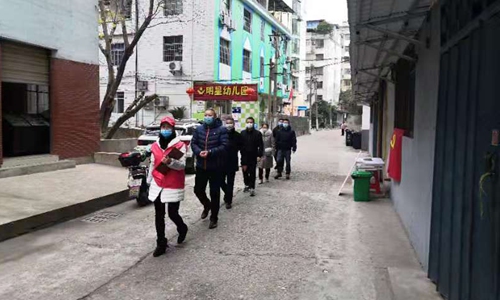HOME >> OPINION
Fighting coronavirus is a people's war
Source:Global Times Published: 2020/2/5 22:13:46

Shangrao in East China's Jiangxi Province sends out nearly 12,000 grid members into streets and lanes to carry out epidemic prevention publicity work, register residents and prevent crowds from gathering. Photo: Courtesy of local official
In order to fight the novel coronavirus, Chinese society has been more mobilized than it was during the SARS period. It has become an unprecedented public health war. An increasing number of southern cities heavily plagued by the epidemic are on lockdown or in a similar state. Citizens there are required to stay at home and only one family member is allowed to go out to buy necessities every other day or longer. All people there have paid the price.
However, most people are responding to the call of the country and local governments. Although they have some complaints, this hasn't prevented them from being united and the fight against the novel coronavirus has generally been carried out in an orderly way. The temporary lockdown doesn't mean the cities are paralyzed, but a part of the highly organized anti-epidemic campaign.
But we have found some problems in the ongoing battle. One of them is that many places have reported cases in which people deliberately concealed their travel history to Wuhan city or Hubei Province and infected many locals. The non-cooperative acts of a few have caused great harm.
While people across the country are jointly fighting the epidemic, such actions should be strongly condemned. Criticism of such behavior should be intensified so that those who are still doing the same or intend to do so would be deterred.
As the post-holiday peak passenger flow is coming, it is now urgent to strengthen the rules of disclosing these people's travels and contacts. We support the legitimate investigation and punishment of those who deliberately conceal their travels to Wuhan or contact with anyone from Wuhan. Through these cases, we need to let the public understand that during such an epidemic, it would be considered criminal to cause serious harm by refusing to cooperate.
Epidemic prevention and control is the top priority for the moment. Many cities have shut their external and internal public transportation systems. Most companies are closed, paying a huge economic price. Citizens are suffering from limited freedom of movement. All those measures aim to detect infected people, confirming their previous trajectory of contacts with others and blocking their future contacts with the outside world.
At this point, if anyone deliberately conceals his or her dangerous trips and contacts with people, willfully interacts with others and causes severe consequences of infection, the behavior can be considered a crime.
According to official figures, 8 million people are set to return to Beijing. Shanghai, Shenzhen and Guangzhou are also facing a large-scale return of people. Before that, we must complete two tasks.
First, we must find out most infected patients and carriers. Second, some carriers cannot be detected in time, so there must be strong mechanisms to keep abreast of their health situation to minimize the risk.
Everyone is faced with tests in this people's war. Let us all keep pace with the national mobilization rather than hinder the battle against the virus. We will eventually be awarded for jointly fighting the epidemic.
Posted in: EDITORIAL